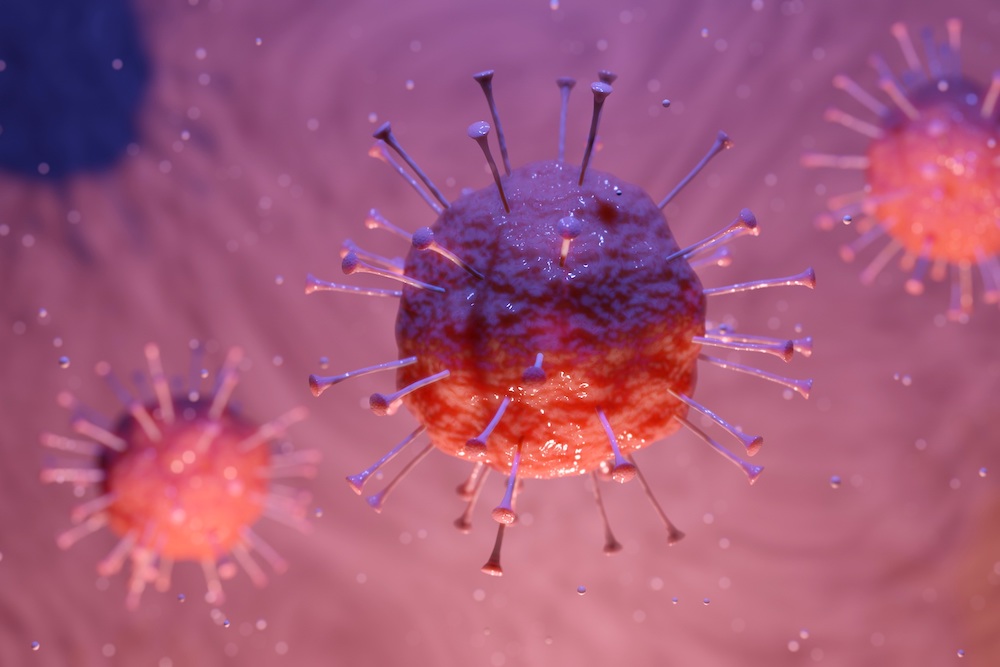
Illustration of the coronavirus (Pixabay/Thor Deichmann)
I wasn't sure what it would look like, or how terrible it would be, but deep in my gut I felt something squirming. An awareness. A knowing. An intuition. I had a feeling that bad days were ahead.
I am fairly certain that my intuition that we were heading toward a humanitarian crisis wasn't unusual. I know I am not unique in this regard. It's connected to the recent uptick in the popularity of dystopian novels and films. It's related to the fear and anxiety that caused this nation to elect a racist, misogynistic and xenophobic president — to latch onto his tendency to scapegoat and split the unity that formed our identity. I've sat in circles with other sisters many times, musing over what we might do once a time of trouble arrived.
But I never thought it would be like this, a global coronavirus pandemic. Yet here we are. The crisis has arrived, and it is serious and costly.
I imagined other horrors: civil wars, ecological destruction, natural disasters, mass extinctions, starvation, political upheaval. I figured that it would be ugly and awful, but the crisis wouldn't be felt by all. (In fact, those horrors are happening in the background, while many people avoid the discomfort of those realities in their daily lives.)
I guess I figured that the crisis we were heading toward would somehow splinter the divisions even deeper: that those with privilege and power could shrink away from the danger if they wanted. I suppose I imagined that it would be so awful that redemption might have felt unlikely. It feels awful to admit that this darkness has been haunting me.
What happened instead is that we were given a crisis that equalized us, that revealed our common humanity. In this coronavirus pandemic, no one is freed from being vulnerable. Not one of us is invincible or free from its dangers. People of every race and economic class are vulnerable — even though those living in poverty will certainly suffer more, without access to adequate healthcare, shelter and sanitation. It doesn't matter what one's sexual orientation or immigration status may be; it makes no difference what one's political leanings, religious affiliations or social associations are. The coronavirus pandemic has united us in our terror, our misery, our grief and pain.
Each of us is impacted; there is no escape. We are one human race and we are all in this together. As Pope Francis wrote in Laudato Sí, citing St. Francis, "Everything is related, and we human beings are united as brothers and sisters on a wonderful pilgrimage, woven together by the love God has for each of his creatures and which also unites us in fond affection with brother sun, sister moon, brother river and mother earth." Perhaps the potential found in the cross of this crisis is that humans must be more awake to our common humanity and our interdependence with the rest of God's creation; our survival demands it.
Awakened more to our common humanity, the pedestals will crumble. The tendency to elevate celebrities, heroes, wealthy, accomplished, famous, and those who we deem most holy must collapse. Every human is rooted in the same ground now. We are all dealing with struggles and sickness, none with no more might than any other. In the fragments of our tendency to uplift others, we'll discover a message: God designed us for equality, for fraternity and communion.
With the pedestals broken down, we have a new question: who can we look up to now?
Advertisement
We may be tempted to look for heroes and saviors. Yes, of course, some have the duty to be on the front lines — thanks be to God for those who make this offering, for those who did sacrifice themselves, in the style of the martyrs of Alexandria. But please don't think that this is the duty of the Catholic sister. Rather reserve this role for those who are highly trained and have deeply discerned that this what the Spirit is urging of them.
We can be overeager to inflate the meaning of our vocation and embrace a call to sacrifice. Stories about humans who boldly risk their health and security for the sake of others become like new bread to us — bread that will grow stale and only offered false solutions and hope. Put another way, this is a good time to resist the temptation to be a hero or find other humans we can put on pedestals.
The cross, where Jesus hangs, that's who we are meant to look up to. The cross: a sign of human suffering, humanity, an expression of oneness, of human brokenness, of endurance, pain, submission, acceptance. Even Jesus Christ our savior and redeemer was susceptible to heartache, anguish, injustice, loss of life. Memento mori, he seems to murmur from overhead, his mouth bleeding with love for all.
We are one, and together we have arrived at a terrible time, a time that some anticipated and imagined. Yet there's a potential in the moment that is beyond what we expected. Now we must listen to Jesus and hear how to respond, how to live our vocation of love in the midst of crisis.
We are no better than anyone else, but we have been deeply doing work to get ready for this time. We have been tending to our bodies and minds for years. Love is the contemplative life of self-care. We have been tireless in our devotion to our inner work, to honoring our humanity. As sisters, we are doing the inner work, we are being true to ourselves. We are modeling this for others.
Thank you, my dear Catholic sisters, for showing me that we are committed to living the Gospel in a unique way through our vowed life, though we are as ordinary as everyone else, weak and needy and moving toward death. Those of you who have explored the depths of what it means to be human, tending to your joys and sorrows and hopes and joys, you are the ones who are teaching me how to respond in love during this moment of crisis. You are teaching us all how to be whole in the sight of God, how to honor our God-given equality. You show me the true meaning of humility.
In this crisis we are called to offer our authenticity and wholeness, shaped by our service and compassion, and our devotion to silence and true love. I am convinced that the call of the Catholic sister is to offer the gift of our humanity, our gaze upon the cross, and the consciousness of our God-given equality. We offer our selves.
[Sr. Julia Walsh, Franciscan Sister of Perpetual Adoration, is a retreat director, speaker, educator, activist and award-winning writer who blogs at MessyJesusBusiness.com. Follow her on Twitter: @juliafspa.]





